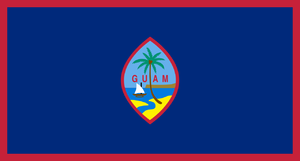Guam
 From Conservapedia - Reading time: 2 min
From Conservapedia - Reading time: 2 min
Guam (gwäm)[1] is the largest and southernmost of the Mariana Islands. It is an unincorporated territory of the United States located in the Pacific Ocean; the residents are full U.S. citizens.
Contents
History[edit]
The island, Guam, was ceded to the United States by Spain in 1898, after the Spanish-American War.[2]
In World War II, Guam was occupied by the Japanese, but American forces landed in July 1944 and took back the island after a three-week battle. Out of 18,000 Japanese troops stationed on the island, only 500 survived to become prisoners of war.[3]
Geography[edit]
The highest point in Guam is Mount Lamlam, which is 1,332 feet (406 m). The weather is usually hot and humid, ranging from 74° to 86°, with an average annual rainfall of 96 inches. Typhoons are common, especially during the months of October and November.[4][5]
Demographics[edit]
The population of Guam is estimated at 162,742 in July 2016.[2] As of 2010, the largest ethnic groups on this island are Chamorro (37.3%), Filipino (26.3%), white (7.1%), and Chuukese (7%).[2] The most common languages, as of 2010, are English (43.6%), Filipino (21.2%), and Chamorro (17.8%).[2] About 85 percent of the population are estimated to be Roman Catholics.[2][6]
Military and geopolitics[edit]
The United States Army and Navy maintains military bases on Guam,[2] which cover 29% of the island's total land area.[7] The U.S. military has maintained its military presence on the island since 1944, when it retook the island from the Japanese during World War II.[7]
Guam is a strategically important U.S. territory in the Pacific.[7]
Politics[edit]
Guam is a relatively conservative U.S. territory. It is a right to work state,[8] and since 2014 it has been a Castle Doctrine[9][10] and concealed carry state.[10][11]
Elected officials[edit]
State[edit]
- Governor: Lou Leon Guerrero (D)
Federal[edit]
- Rep. Michael San Nicolas [D, GU-0]
See also[edit]
- World History Lecture Ten
- World History Lecture Twelve
- Northern Mariana Islands
- No Daylight Savings Time in Guam
- Guam Statehood
References[edit]
- ↑ http://www.yourdictionary.com/guam
- ↑ 2.0 2.1 2.2 2.3 2.4 2.5 Guam - The World Factbook. CIA. Retrieved September 30, 2016.
- ↑ Chronicle of the 20th Century, ed. by Clifton Daniel, Chronicle Publications, 1987
- ↑ http://ns.gov.gu/visiting.html
- ↑ http://ns.gov.gu/agana.html
- ↑ Goldman, David; Biesecker, Michael (August 9, 2019). Catholicism ingrained in daily life on US island of Guam. Associated Press. Retrieved August 9, 2019.
- ↑ 7.0 7.1 7.2 Guam: Small But Important Piece of US Territory in Pacific. Voice of America. August 9, 2017. Retrieved August 10, 2017.
- ↑ Right to Work Laws. National Conference of State Legislators. Retrieved September 30, 2016.
- ↑ Fernandez, Janna (February 10, 2014). Press Release - "YOUR RIGHTS: Calvo Signs Ada’s Castle Doctrine into Law". Office of Governor Eddie Baza Calvo. Retrieved September 30, 2016.
- ↑ 10.0 10.1 Miculka, Cameron (January 30, 2016). Gov. Calvo endorses Ted Cruz for president. Pacific Daily News. Retrieved September 30, 2016.
- ↑ Matanane, Sabrina Salas (May 28, 2014). "Governor Signs 12 Bills, Vetoes 2" Kuam News. Retrieved September 30, 2016.
External links[edit]
- Greenwood, Max (August 10, 2017). 5 things to know about Guam. The Hil.
 KSF
KSF

